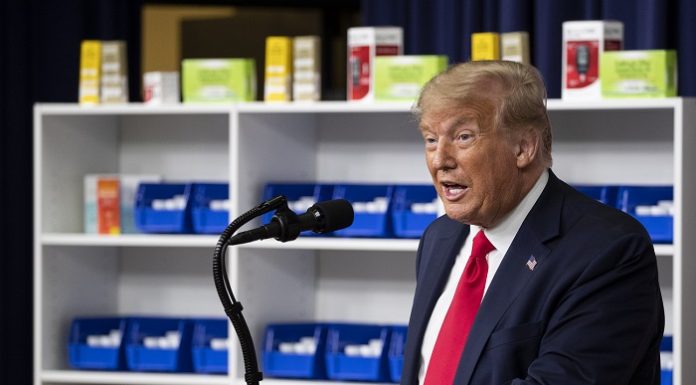(Headline USA) At a White House ceremony Friday, Presidnet Donald Trump signed four executive orders to to reduce the drug prices.
The four orders would:
— Allow states, wholesalers and pharmacies to import FDA-approved drugs from foreign countries and sell them in the U.S.
Trump has long complained that countries where the government sets the price of drugs are taking advantage of American consumers. The order includes a special provision to allow wholesalers and pharmacies to re-import insulin and biological drugs.
— Use the lowest price among other economically advanced countries to set what Medicare pays for certain drugs administered in a doctor’s office, including many cancer medications.
This would apply to the most expensive medications covered by Medicare’s “Part B,” which pays for outpatient care. Drugmakers are particularly leery of the approach, since Democrats want to use it more broadly to allow Medicare to directly negotiate prices.
— Direct federally funded community health centers to pass discounts they now get for insulin and EpiPens directly to low-income patients.
— Ensure that rebates drugmakers now pay to benefit managers and insurers get passed directly to patients when they buy a medication.
“I’m unrigging the system that is many decades old,” Trump declared, promising “massive” savings.
Consumers may not notice immediate changes, since the orders must be carried out by the federal bureaucracy and could face court challenges.
Trump came into office complaining that pharmaceutical companies were “getting away with murder” and promising to bring them under control.
Trump pulled his punches, Pelosi said in a statement. “After promising that he would ‘negotiate like crazy’ for lower prescription drug prices, it is clear that President Trump meant not negotiate at all.”
A drive to enact major legislation this year stalled in Congress. AlthougTrump told Republican senators that lowering prescription prices is “something you have to do,” many remain reluctant.
Last year the House did pass Pelosi’s Medicare negotiations bill, which would have capped out-of-pocket drug costs for older people and expanded program benefits as well. It had no path forward in the Republican Senate, and the White House calls it unworkable.
But there was an alternative. A bipartisan Senate bill backed by Trump stopped short of giving Medicare bargaining power, but would have limited annual price increases and capped costs for older people. The bill passed out of a Senate committee but was never brought to the full body.
“It’s not clear why the administration hasn’t made a bigger push to line up votes to get a bill through the Senate and a deal with Congress, given strong public support to lower drug costs,” said Tricia Neuman, a Medicare expert with the nonpartisan Kaiser Family Foundation.
Americans remain worried about drug costs, with nearly 9 in 10 saying in a recent Gallup-West Health poll that they’re concerned the pharmaceutical industry will take advantage of the coronavirus pandemic to raise prices.
It’s a particularly important issue for older people.
Drugmakers remain adamantly opposed to government efforts to curb prices.
Trump’s administration “has decided to pursue a radical and dangerous policy to set prices based on rates paid in countries that he has labeled as socialist, which will harm patients today and into the future,” Stephen Ubl, head of the pharmaceutical lobby, said in a statement.
Trump delayed the effective date of the international pricing order for a month, to see if he can get a deal with industry.
Adapted from reporting by the Associated Press.

